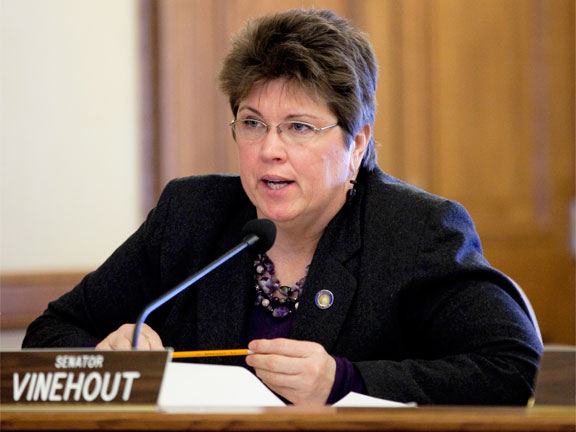Commentary: ‘Property Rights’ Bill Leaves Too Many Questions
- Share
- Tweet
- Pin
- Share

By Senator Kathleen Vinehout
If passed into law, a recently introduced bill will have profound implications on the ability of local government to protect its residents from unexpected developments.
Assembly Bill 582, written by Sen. Frank Lasee and Rep. Adam Jarchow, would affect local government in a number of ways.
The bill expands the legal concept of “vested property rights” – that is, because I own property, I have a right to do what I want on the property – to limit the actions of local government. Some argue that if one owns property, one should be able to do anything on that property.
The problem comes when my use of my property impinges on everyone else’s rights.
Assembly Bill 582 builds on Act 74, which was written by Lasee and became law in 2013, and goes much further still.
The bill seems to freeze the requirements and prohibitions of all levels of government at the time of the first application. For example, on the date a person applies for a driveway permit and discloses the proposed project, the ordinances, and rules of all levels of government are frozen on that date provided the driveway is constructed within any stated deadline – even though some aspects of the project may not be completed for many years.
There is no way a town could set an expiration date for a permit for a driveway if the granting of that permit allowed the developer to proceed with an industrial operation – like a sand mine – that involved approval across political subdivisions and could include the state. And if the developer first sought permission for a minor permit from the state, local government might not even know the granting of that permit would mean the entire project had become a “vested right” of the developer.
The bill changes the definition of the words “approval” and “project.” A project is clearly not limited to a housing development. A project is any “improvement activity or use” and could include a sand mine or a fireworks factory.
The bill also gives “vested rights” retroactively. If passed into law, AB 582 would apply to any project not finally approved by the time the bill is passed. The bill would also apply to any “pending” court cases.
The provisions related to projects not yet approved and pending court cases make me think there are many implications we do not yet know. I fear these implications may not become public until after the bill becomes law.
The bill also directs the courts “to resolve any ambiguity in a matter involving a zoning ordinance or shoreland zoning ordinance in favor of the free use of private property.” Can the legislature direct the courts how to resolve a case?
There are a few of other provisions in AB 582 related to local abilities:
- The bill would prohibit a county from taking a breather (development moratorium) while a comprehensive zoning amendment or a bourgeoning development previously unanticipated is studied and thoughtfully considered.
- Local government must notify every landowner of every property affected by a zoning change. They no longer have to keep a list of people who asked to be notified of zoning changes. The county cannot charge the developer or anyone else for the cost of providing the notification. I learned of two possible implications of the change. There are both citizens and advocacy groups who want to be notified of zoning changes. Given the list is no longer required, they would not be guaranteed notification unless their property was impacted. Second, a large area of land (for example a zoning overlay district) might be affected by a zoning change. Notifying each landowner could cost the county thousands of dollars.
- Non-conforming structures on shoreland could be torn down and replaced with another non-conforming structure that is, in part, located on the original building’s footprint. Zoning permits non-conforming structures to remain, but prohibits expansion in the hopes that over the decades all properties will conform.
- A town’s comprehensive plan may not prohibit any use specified as a conditional use in a zoning ordinance enacted by a town. Here I think of a town acting to prohibit sand mines allowed by conditional use permits.
- Makes “down zoning” more difficult and probably ineffective. Down zoning is moving a housing use, for example, from multiple to single families. It is sometimes used to recast zoning when development plans do not correlate with the projection of developers or to protect housing stock in vulnerable neighborhoods from developers who would break up single-family homes and convert them to multi-tenant buildings. The bill also requires a three-quarters vote. Because most towns have only three supervisors, it is actually a unanimous vote. Requiring a unanimous vote is unprecedented in town government and likely all local government.
- Land awaiting development would be taxed according to its prior use (agriculture, forest, etc.) rather than an assessment of its true value.
This bill would eliminate the ability of local government to respond to an unanticipated major development or change in land use. All I can think is that few, if any of us, anticipated in 2008 the “sand rush” beginning in 2010. What new use for land might emerge that is not now codified in existing zoning ordinances?
Land use ordinances, zoning, subdivision regulations, shoreland zoning restrictions all came about to protect our communities from willy-nilly development. We – collectively – wanted a nice place to live and raise our families. People do not want industrial sites next door to their piece of paradise. This bill takes away the collective rights of the community and the individual rights of landowners adjacent to developers. The bill gives rights to developers who may not live anywhere near the development from which they will profit.
You can find a copy of the bill and follow its progress at http://docs.legis.wisconsin.gov/2015/proposals/ab582.
I urge you to oppose the bill, encourage your fellow citizens to oppose the bill, contact your representatives and join local government in passing resolutions opposing the bill.

